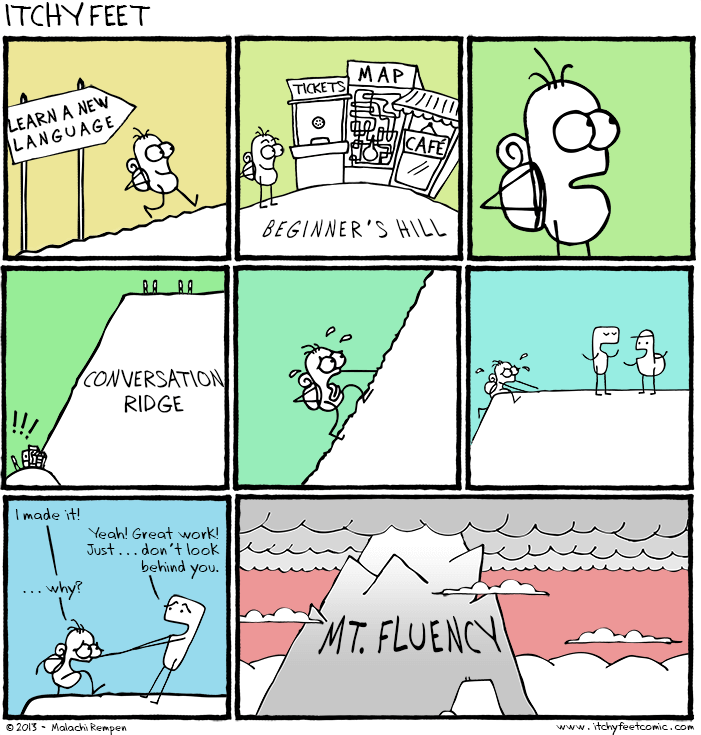So you’ve gotten pretty good at communicating with clients and colleagues in English. Now what?
Are you happy with ‘good enough’, or do you want to be great? When it comes to learning a language your journey is far from over. In fact, it has just begun.
Sometimes, when we start getting really good at a skill, we tend to hit a plateau. That means that we get too comfortable and reach something called the ‘OK Plateau‘.
This is when we reach the point where we do something well enough that we stop improving.
According to Brain Pickings:

For one, it means that we get so comfortable communicating using the vocabulary we already know that we forget that there are probably thousands more words that we could be learning.
While our writing is great, we might forget that we need to refine and perfect our skills in perfecting certain grammatical concepts, such as verb tenses or articles.
The OK plateau was first recognised by psychologists Paul Fitts and Michael Posner but it is something we can all relate to. Think of it as a “creative block”.
And yes, learning is a creative activity.
In The War of Art, Steven Pressfield believes that reaching a plateau means that we are not doing the work necessary to rise above it. When we procrastinate, it means that we are letting our inner resistance take over.
He believes that Resistance (he spells it with a capital R) is an inner voice that tells us not to do any work. He says:
There are 4 techniques you can use:

Learning involves making mistakes. When practicing English, get out of your comfort zone and put your skills out there.
Some of the best learners study their failures. They monitor mistakes they consistently make and focus on the skills they haven’t quite mastered yet.
They know that they have a long way to go before they become better, and that learning is a lifelong process.
Go ahead and think about the mistakes you’ve been making. Can’t think of any? That means you need to start tracking it.
Once you’ve figured out what English skills you need to work on, focus on improving on them.
If you aren’t sure of how to track your mistakes, here are some suggestions:

What does fear have to do with getting stuck?
According to Steven Pressfield, fear matters a lot. Sometimes English learners plateau because they feed into their fears. They might fear they’re not good enough to do the work.
Being scared isn’t a bad thing. In fact, Pressfield believes that being scared is good:
Having self-doubt indicates that you know you have a lot more work to do.
So how do you overcome your fear? Try one of these techniques:

Sometimes all you need is to get some outside accountability. Sure, you may be taking classes or participating in local conversation groups. But you might have gotten too comfortable with these people and don’t care when they point out mistakes to you. Putting yourself in a more competitive situation can push you to learn more.
Some ways to get more competitive can include entering an contest that involves English.
Go and do a quick search on your local area to see if they have speech contests, or even a local Toastmasters group where you can practise giving a speech in public. Speaking in front of a group of strangers is certainly different than practicing with a friend.
Why not enter writing contests meant for native English speakers? You will be competing against people with excellent skills, so that means you really need to push yourself.

We’re all human. Sometimes there are so many things going on in our already busy lives that we get burnt out. We start by coming home from work tired. It might even lead to loss of sleep, or even being irritable around our friends and family.
Other people might notice that they do really well for the first few weeks studying new vocabulary. All of a sudden, they might start to slack off, or start skipping their English classes, finding any excuse not to go.
Don’t feel guilty if you’re not as productive when you feel burnt out. It’s simply your body’s way of telling you that you need to take time to slow down.
Sometimes, being more productive means that you need to take a break every once in a while.
It’s great that your goal is to perfect and become very fluent in English, but you risk getting severely burnt out. Take at least a day off where you’re not studying English. Reflecting on your achievements can help as a quick motivator to further your skills.
For example, if you feel like you can’t learn any more vocabulary words, take the time to revisit words you’ve already learned. Really look at the words to get a sense of what the definitions are, and how you can apply them in a work setting.
Take the time to consider how you can apply what you learned. During this process, you might even find that you discover new definitions of those words. You might even find that taking the time to revisit these words gets you excited about learning more.
There is nothing wrong with not always pushing yourself. Constantly pushing our limits means that it’s difficult to keep perspective, to check objectively that our study methods are actually effective.
You don’t have to slow down for long periods either. Sometimes, a few days or even a week is all it takes for you to get back on track.
 No matter what stage of learning you are at, it is normal to reach a point where you’re not progressing as fast as you used to.
No matter what stage of learning you are at, it is normal to reach a point where you’re not progressing as fast as you used to.
Overcoming plateaus in your learning might mean that you need to slow down for a few days. It might also mean that you need to make more mistakes, and get more outside accountability in order to improve.
Are you happy with ‘good enough’, or do you want to be great? When it comes to learning a language your journey is far from over. In fact, it has just begun.
Sometimes, when we start getting really good at a skill, we tend to hit a plateau. That means that we get too comfortable and reach something called the ‘OK Plateau‘.
This is when we reach the point where we do something well enough that we stop improving.
According to Brain Pickings:
We reach this OK Plateau in pursuing just about every goal, from learning to drive to mastering a foreign language to dieting.
After an initial stage of rapid improvement, we find ourselves in that place at once comforting in its good-enoughness and demotivating in its sudden dip in positive reinforcement.
So how does this relate to you and learning English?

For one, it means that we get so comfortable communicating using the vocabulary we already know that we forget that there are probably thousands more words that we could be learning.
While our writing is great, we might forget that we need to refine and perfect our skills in perfecting certain grammatical concepts, such as verb tenses or articles.
The OK plateau was first recognised by psychologists Paul Fitts and Michael Posner but it is something we can all relate to. Think of it as a “creative block”.
And yes, learning is a creative activity.
Getting Unstuck
With all creative activities, sometimes we get stuck. Reaching a plateau in our learning means we’ve stumbled upon our creative block.In The War of Art, Steven Pressfield believes that reaching a plateau means that we are not doing the work necessary to rise above it. When we procrastinate, it means that we are letting our inner resistance take over.
He believes that Resistance (he spells it with a capital R) is an inner voice that tells us not to do any work. He says:
The most pernicious aspect of procrastination is that it can become a habit. We don’t just put off our lives today; we put them off till our deathbed.Yes, it can be as simple as that, doing our work. But what do we need to do exactly to get over the OK plateau and continue improving our English?
Never forget: this very moment, we can change our lives. There never was a moment, and never will be, when we are without the power to alter our destiny. This second we can turn the tables on Resistance.
This second, we can sit down and do our work.
There are 4 techniques you can use:
1. Make Mistakes on Purpose

Learning involves making mistakes. When practicing English, get out of your comfort zone and put your skills out there.
Some of the best learners study their failures. They monitor mistakes they consistently make and focus on the skills they haven’t quite mastered yet.
They know that they have a long way to go before they become better, and that learning is a lifelong process.
Go ahead and think about the mistakes you’ve been making. Can’t think of any? That means you need to start tracking it.
Once you’ve figured out what English skills you need to work on, focus on improving on them.
If you aren’t sure of how to track your mistakes, here are some suggestions:
- Sign up for a language exchange class, and have
your partner point out errors you make during your conversation. Write
down what specific mistakes you make on a spreadsheet, a notepad or even
by using an app like Evernote.
It might be also helpful to note the dates when you’ve made these mistakes. At the end of the week, review the list to see if you notice any patterns. - Write every day. Try to aim for 500 words daily. After a few days, go and look at what you’ve written to see if you can spot mistakes. Also, give your pieces of writing to your teacher, or even friends who are native English speakers.
- If you notice any patterns, such as skills you’re not good at, make it a goal to learn them. Mark out a plan for the next two weeks to focus only on learning those and applying them in a real world context.
2. Overcome Fear

What does fear have to do with getting stuck?
According to Steven Pressfield, fear matters a lot. Sometimes English learners plateau because they feed into their fears. They might fear they’re not good enough to do the work.
Being scared isn’t a bad thing. In fact, Pressfield believes that being scared is good:
Fear is good. Like self-doubt, fear is an indicator. Fear tells us what we have to do.Maybe you’re scared because you’re due for a promotion and you’re not sure your English is good enough. Feeling fearful means that you really want something, such as that promotion you’ve been dreaming about.
Remember our rule of thumb: the more scared we are of a work or calling, the more sure we can be that we have to do it.
Resistance is experienced as fear; the degree of fear equates to the strength of Resistance. Therefore the more fear we feel about a specific enterprise, the more certain we can be that that enterprise is important to us and to the growth of our soul. That’s why we feel so much Resistance. If it meant nothing to us, there’d be no Resistance.
Having self-doubt indicates that you know you have a lot more work to do.
So how do you overcome your fear? Try one of these techniques:
- Acknowledge your fear. In English, or whatever language you’re most comfortable with, write down what you’re scared of. You might even want to speak about your fears with a trusted friend. Getting your fears out in the open is part of letting go of them. You’d be surprised at how much better you feel once you recognize your fears.
- Remember the best case scenario. Analyze what would happen in the best case scenario – will you get promoted, or land that client you’ve been trying to get for ages? Keep these scenarios in mind every time fear crops up.
3. Get Competitive

Sometimes all you need is to get some outside accountability. Sure, you may be taking classes or participating in local conversation groups. But you might have gotten too comfortable with these people and don’t care when they point out mistakes to you. Putting yourself in a more competitive situation can push you to learn more.
Some ways to get more competitive can include entering an contest that involves English.
Go and do a quick search on your local area to see if they have speech contests, or even a local Toastmasters group where you can practise giving a speech in public. Speaking in front of a group of strangers is certainly different than practicing with a friend.
Why not enter writing contests meant for native English speakers? You will be competing against people with excellent skills, so that means you really need to push yourself.
4. Slow Down

We’re all human. Sometimes there are so many things going on in our already busy lives that we get burnt out. We start by coming home from work tired. It might even lead to loss of sleep, or even being irritable around our friends and family.
Other people might notice that they do really well for the first few weeks studying new vocabulary. All of a sudden, they might start to slack off, or start skipping their English classes, finding any excuse not to go.
Don’t feel guilty if you’re not as productive when you feel burnt out. It’s simply your body’s way of telling you that you need to take time to slow down.
Sometimes, being more productive means that you need to take a break every once in a while.
It’s great that your goal is to perfect and become very fluent in English, but you risk getting severely burnt out. Take at least a day off where you’re not studying English. Reflecting on your achievements can help as a quick motivator to further your skills.
For example, if you feel like you can’t learn any more vocabulary words, take the time to revisit words you’ve already learned. Really look at the words to get a sense of what the definitions are, and how you can apply them in a work setting.
Take the time to consider how you can apply what you learned. During this process, you might even find that you discover new definitions of those words. You might even find that taking the time to revisit these words gets you excited about learning more.
There is nothing wrong with not always pushing yourself. Constantly pushing our limits means that it’s difficult to keep perspective, to check objectively that our study methods are actually effective.
You don’t have to slow down for long periods either. Sometimes, a few days or even a week is all it takes for you to get back on track.
Conclusion

Go forth on your journey!
Overcoming plateaus in your learning might mean that you need to slow down for a few days. It might also mean that you need to make more mistakes, and get more outside accountability in order to improve.